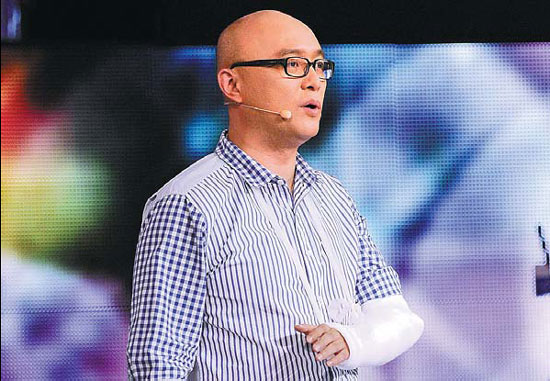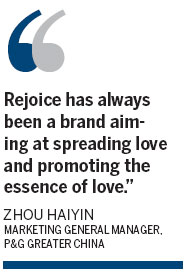Passion for a product and a product made with passion
Updated: 2013-01-07 10:33
By Shi Jing in Shanghai (China Daily)
|
|||||||||||
|
 |
|
Meng Fei, anchorman of Jiangsu Television, hosting the nation's most popular dating TV program If You Are the One. He is wearing a bandage on his wounded left arm but is too busy to take days off because of his demanding schedule. [Photo/China Daily] |
The American journalist and humorist Helen Rowland once said variety is the spice of love, an aphorism now being extended to the highest-rating Chinese dating show.
If You Are the One decided it needed something new this year so it selected Rejoice, the first brand of consumer goods giant Procter and Gamble to enter China, as a partner for a new section called Love's Around the Corner.
 |
If the male guest is not picked by one of the 24 women candidates on the stage, he will be given a second chance among the Love's Around the Corner girls sitting among the audience in seats selected by Rejoice through various off-line activities.
Initially the new section will last for a season. Further cooperation depends on the program's own plans as well as the profits it can bring to Rejoice.
Rejoice is investing heavily in the promotion to the tune of about 500 million yuan ($80.26 million). It hopes its sales in China will be boosted by 15 percent after gaining 12 percent growth through its own efforts in the first quarter of last year, according to Zhou Haiyin, marketing general manager for P&G Greater China.
"Rejoice has always been a brand aiming at spreading love and promoting the essence of love. Based on the principle of mutual benefit, we hope this cooperation will have an impact on a larger customer base," said Zhou.
P&G is one of the most experienced consumers goods brands in cooperating with entertainment programs. In 2011, China's Got Talent was sponsored by its Head & Shoulders, helping the anti-dandruff shampoo gain a 22 percent increase in annual sales to 3 billion yuan. The recognition rate for the product witnessed a 10 percent increase in the Chinese market in which gaining just a 1 percent increase is difficult.
"The proliferation and success of such talent shows is a really good example of a genre of entertainment value based on what people like to see and vote in. That genre has been a phenomenal success everywhere in the world. It has created new audiences and people watch them live," said Steven King, global chief executive officer of the world renowned return-on-investment agency ZenithOptimedia.
"People can download most programs and they 'fast-forward' during the adverts. But with programs such as Super Girl and China's Got Talent, people watch them live and vote live. That adds much value to this kind of entertainment," he added.
Joining hands with TV programs is one way brands can be part of real life rather than just buying advertising space. Instead of placing commercials during the breaks, they now prefer to put their product inside a show, said Vincent Digonnet, president for Asia-Pacific at the world's leading interactive agency Razorfish, part of the advertising and public relations Publicis Group.
"That started some 70 years ago with the making of so-called soap operas. They were called soap operas because often cleaning product companies sponsored TV series in which their products were used. It was not advertising. It was product placement. The idea was revived in the James Bond series, which is a great example with its great product placement of BMW cars," he added.
But not every attempt at entertainment marketing necessarily results in success.
Related Stories
Cameron Pace Group sets up China HQ for 3-D entertainment 2012-04-27 10:41
International advertising companies would do well to learn from their Chinese counterparts 2012-09-25 11:23
JV to develop C919 cabin entertainment system 2012-03-28 10:14
A new dimension in entertainment to hit Beijing 2011-01-31 15:20
The advertising boom in China 2012-11-20 15:05
Web-video advertising revenues up 77.9% in Q3 2012-11-02 09:21
Today's Top News
President Xi confident in recovery from quake
H7N9 update: 104 cases, 21 deaths
Telecom workers restore links
Coal mine blast kills 18 in Jilin
Intl scholarship puts China on the map
More bird flu patients discharged
Gold loses sheen, but still a safe bet
US 'turns blind eye to human rights'
Hot Topics
Lunar probe , China growth forecasts, Emission rules get tougher, China seen through 'colored lens', International board,
Editor's Picks

|

|

|

|

|

|





